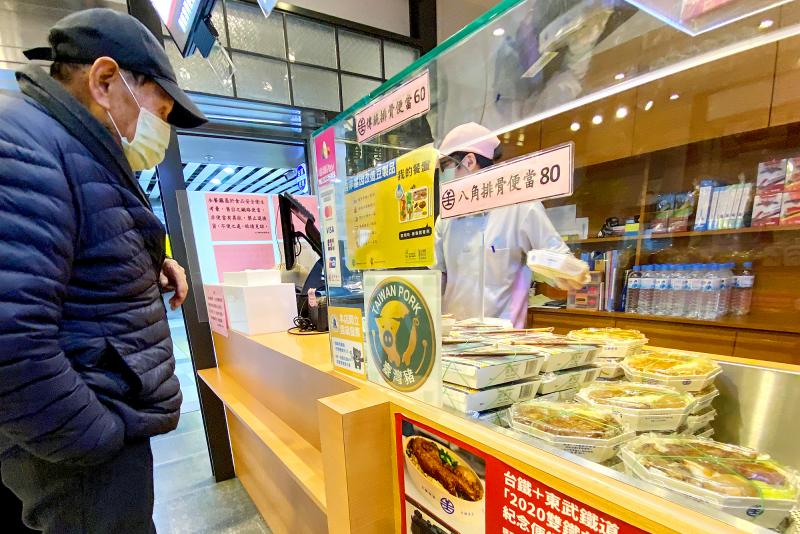Taiwanese restaurants and hotel chains said that they are under pressure to raise prices to reflect expected increases in the price of locally produced pork amid health concerns about pork containing traces of ractopamine.
However, there are also concerns that doing so could scare away potential customers.
A policy allowing imports of US pork containing the animal feed additive came into effect on Friday. Local producers are not allowed to use ractopamine.

Photo: CNA
Several major restaurant chains in Taiwan, such as Wowprime Corp (王品), Tai Tong Food & Beverage Group (TTFB, 瓦城泰統集團), Hi-Lai Foods Co (漢來美食), Bafang Yunji International Co (八方雲集) and Tofu Restaurant Co (豆府), as well as Formosa International Hotels Corp (晶華國際酒店集團) and LDC Hotels & Resorts Group (雲朗觀光集團), said they are using only pork produced in Taiwan or pork from countries that do not use ractopamine.
For example, Bafang Yunji, which operates 1,000 dumpling restaurants across Taiwan, said that it only uses Taiwanese pork at its outlets in central and southern Taiwan.
Its northern Taiwan stores mainly use locally produced pork, but have imported a “small amount” of ractopamine-free pork from Denmark.
Meanwhile, Wowprime, which operates 21 restaurant brands with a total of 280 stores nationwide, said that most of its pork is from Taiwan, although it has also imported some from Denmark, as well as lard from Japan.
TTFB said that none of its restaurants use US pork products and clearly label the country of origin in accordance with government regulations.
However, several restaurant and hotel chain operators said they might be forced to raise their prices soon, as many Taiwanese pork vendors are planning to raise their prices because the new policy is expected to boost demand for locally produced pork.
A restaurant chain operator, who asked to remain anonymous, said that although most imported pork does not contain ractopamine, almost all restaurants believe the only way to convince customers of the safety of their products is to use only Taiwanese pork.
This would lead to significantly higher domestic pork prices and increase restaurants’ costs, but they are reluctant to increase prices as that would affect their businesses, the operator said.
“We are caught in a dilemma,” they added.
Another senior manager at a restaurant chain said that despite the central government’s policy, many local governments continue to ban ractopamine.
The manager, who also asked to remain anonymous, called on the government to come up with a single nationwide standard regarding the use of ractopamine so that restaurant operators would have clear guidelines to follow.
Ractopamine is banned in the EU and China because of concerns over safety for both animals and humans. The US allows the use of ractopamine, and had said that Taiwan’s zero-tolerance policy impeded trade.
Since the new policy was announced on Aug. 28, a number of local governments have said that they would continue to ban ractopamine in pork.
However, the Cabinet has said that local government bans have no validity.

SEMICONDUCTORS: The German laser and plasma generator company will expand its local services as its specialized offerings support Taiwan’s semiconductor industries Trumpf SE + Co KG, a global leader in supplying laser technology and plasma generators used in chip production, is expanding its investments in Taiwan in an effort to deeply integrate into the global semiconductor supply chain in the pursuit of growth. The company, headquartered in Ditzingen, Germany, has invested significantly in a newly inaugurated regional technical center for plasma generators in Taoyuan, its latest expansion in Taiwan after being engaged in various industries for more than 25 years. The center, the first of its kind Trumpf built outside Germany, aims to serve customers from Taiwan, Japan, Southeast Asia and South Korea,

Gasoline and diesel prices at domestic fuel stations are to fall NT$0.2 per liter this week, down for a second consecutive week, CPC Corp, Taiwan (台灣中油) and Formosa Petrochemical Corp (台塑石化) announced yesterday. Effective today, gasoline prices at CPC and Formosa stations are to drop to NT$26.4, NT$27.9 and NT$29.9 per liter for 92, 95 and 98-octane unleaded gasoline respectively, the companies said in separate statements. The price of premium diesel is to fall to NT$24.8 per liter at CPC stations and NT$24.6 at Formosa pumps, they said. The price adjustments came even as international crude oil prices rose last week, as traders

SIZE MATTERS: TSMC started phasing out 8-inch wafer production last year, while Samsung is more aggressively retiring 8-inch capacity, TrendForce said Chipmakers are expected to raise prices of 8-inch wafers by up to 20 percent this year on concern over supply constraints as major contract chipmakers Taiwan Semiconductor Manufacturing Co (TSMC, 台積電) and Samsung Electronics Co gradually retire less advanced wafer capacity, TrendForce Corp (集邦科技) said yesterday. It is the first significant across-the-board price hike since a global semiconductor correction in 2023, the Taipei-based market researcher said in a report. Global 8-inch wafer capacity slid 0.3 percent year-on-year last year, although 8-inch wafer prices still hovered at relatively stable levels throughout the year, TrendForce said. The downward trend is expected to continue this year,

POWERING UP: PSUs for AI servers made up about 50% of Delta’s total server PSU revenue during the first three quarters of last year, the company said Power supply and electronic components maker Delta Electronics Inc (台達電) reported record-high revenue of NT$161.61 billion (US$5.11 billion) for last quarter and said it remains positive about this quarter. Last quarter’s figure was up 7.6 percent from the previous quarter and 41.51 percent higher than a year earlier, and largely in line with Yuanta Securities Investment Consulting Co’s (元大投顧) forecast of NT$160 billion. Delta’s annual revenue last year rose 31.76 percent year-on-year to NT$554.89 billion, also a record high for the company. Its strong performance reflected continued demand for high-performance power solutions and advanced liquid-cooling products used in artificial intelligence (AI) data centers,